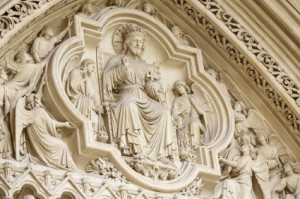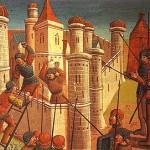 The administration by which God has chosen to rule and reconcile creation is unique. Because there has only been one such administration, the problem the Lord faced was how best to communicate its existence to people who had no concept of it. Imagine, for example, tring to communicate the idea of an airplane to a people who had never seen one. The best one can do with something no one has ever seen before is to describe it. Names are not helpful because they only have meaning associated with a known object.
The administration by which God has chosen to rule and reconcile creation is unique. Because there has only been one such administration, the problem the Lord faced was how best to communicate its existence to people who had no concept of it. Imagine, for example, tring to communicate the idea of an airplane to a people who had never seen one. The best one can do with something no one has ever seen before is to describe it. Names are not helpful because they only have meaning associated with a known object.
One way to communicate descriptive information is by means of a metaphor. Through a metaphor one can describe something previously unknown by using something known. Metaphors also have the benefit of communicating a package of information by picture or story that would be burdensome if not impossible to convey by mere description.
Choosing a good metaphor necessarily requires an understanding of the thing being described and the comparative thing so that one can know which metaphor is most analogous. One must also understand one’s audience to know what metaphor is best understood by the audience. Otherwise, one may choose a metaphor that gives the wrong impression when viewed in light of the experience of the audience.
People choose metaphors from their own limited pool of knowledge and experience. The Lord does not suffer from such limitations. We can rest assured that when the Lord chooses a metaphor, He has chosen for us the metaphor which paints the best and most accurate picture of that which is being described. We can know then when Jesus sought to describe this thing He called “the kingdom,” He chose the most accurate metaphor possible.
Taking this a logical step further, this also must mean there is something to learn about the kingdom of God by looking at earthly kingdoms. By exploring components common to earthly kingdoms we can begin to understand the design of God’s kingdom. As with any metaphor though, at some point the comparison breaks down. This cannot be avoided because the only way a metaphor could not break down is if the two things being compared were identical in all respects, in which case the metaphor would not be a metaphor but the thing it sought to describe.
How do we know how far we can pursue the metaphor of the kingdom as an accurate description? Certainly, the outside boundary must be the point where the metaphor contradicts scripture. That does not mean anything short of contradicting scripture is accurate though because the metaphor may lead us to a conclusion that is not contradicted by scripture but is not specifically supported in scripture. Any conclusion we might draw about the kingdom of God at that point may be true, but we could not be sure. Where the metaphor leads to a conclusion supported by scripture though, we can know we stand on solid ground.
I mention all this because much of what you read in this blog will flow from the presupposition of the kingdom metaphor. See, for example. 2 Benefits of Kingdom Citizenship, How King Jesus Rules and The Role of Citizenship in the Kingdom. So, next time you read in the Bible Jesus using the word “kingdom,” recognize He is describing something; He is providing information to you about the administration by which He rules the earth.





 Matthew 6:33
Matthew 6:33